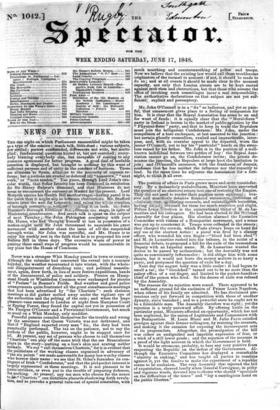NEWS OF THE WEEK.
TEE one night on which Parliament reassembled might be taken as a type of the session : much talk, little deed ; various subjects, few settled; ,partial} confounded, differences not wide, but multi- plied ; fundamental.queitions hinted at, but not searched; every- body blaming everybody else, but incapable of coming to any common agreement for better progress. A good deal of laudable intention is displayed, but brought to nothing by this want of sufficient purpose and of unity in the conduct of business. There are allusions to Spain, allusions to the necessity of organic re- forms ; but questions are evaded or deferred till " tomorrow," "next week," or "next session." You guess, through Lord John's ora- cular words, that Sailor Isturitz has been dismissed in retaliation for Sir Henry Bul,wer's dismissal, and that Ministers do not mean to reconstruct the embassy at Madrid for the present. Lord Morpeth carries his lIealth Bill another stage—having pared it to the quick that it might slip in between obstructions. Mr. Stafford tries to issue the writ for Leicest-r. and raises the wit le ouestion of borouel corruptiewieUvut ;wine. it inch. John HantnerVs Borough Eleitoins Bili,ilkceeds one stage, in spite of Ministerial, countenance.. And much talk is spent on the subject of next Tuesday; Sir-John Pakington competing with poor Mr. Hume, who had thought himself at last in possession of a motion-night until Sir Johif threatened to supersede his great movement with another about the issue of alk the suspended. borough writs. Sir John was merciful, and Mr. Hume is to enjoy his weekly rest in the faith that he is to propound his new Reform Bill in three days. The excessive waste of power iri gaining these small steps of progress would be inconceivable in any place but the House of Commons.
























